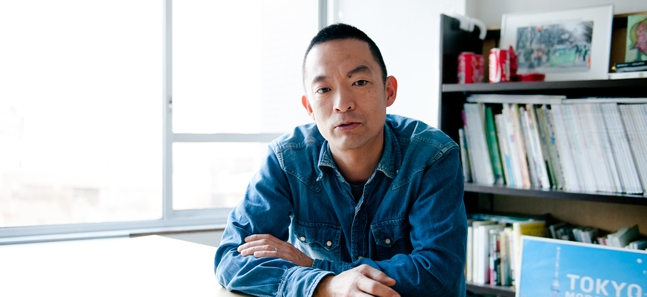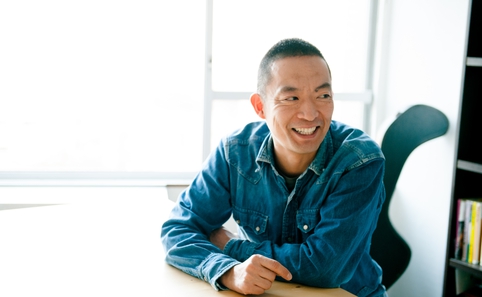The first step toward same-sex marriage in Japan?
Yuki Keiser talks to Shibuya council member Ken Hasebe about the new 'partnership certificate'

Posted: Fri Mar 06 2015
Shibuya Ward’s recent proposal to issue 'marriage-status' certificates to same-sex couples for the first time in Japanese history caused a stir in the media, with a number of other municipalities, including Setagaya and Yokohama, now also communicating that they are already considering similar policies. This move has raised hopes of impending progress in Japan as a whole, considering that countries like Germany and Switzerland also passed same-sex partnership initiatives on regional levels before the policies eventually achieved nationwide approval. For an inside look at how Shibuya came to make such a revolutionary move, we asked writer Yuki Keiser, a specialist in LGBT issues, to interview Ken Hasebe, Shibuya council member and the man behind the certificate initiative. Hasebe argues that although not legally binding, the certificate marks a 'meaningful step toward gay marriage'.
The long road toward equal rights
The journey to same-sex marriage has started in Japan, however internationally the history of these initiatives spans over 25 years. The first country to officially recognise same-sex partnerships was Denmark in 1989, with Sweden, Norway, France and others following suit in the '90s. Such arrangements became common practice in the 2000s and have finally been giving way to full same-sex marriage laws over the past few years. 2013 was particularly groundbreaking, as that year saw both France and the UK enact marriage equality legislation, while the US Supreme Court overturned the 17-year-old Defense of Marriage Act (DOMA), which has defined US marriages on federal level to be between a woman and man only. DOMA's shutdown started a domino effect, with more than two thirds of US states now allowing gay marriage. January 2015 saw the Supreme Court announce that it would also rule on the federal status of such marriages by early summer this year.
While LGBT people tended to be stereotypically portrayed only as fashionable, artistic or 'edgy' in the past, the last couple of years have seen an increase in LGBT families appearing as ‘normal' families in the international mainstream media. For example, companies like Tiffany’s, Nikon and Microsoft have begun to depict LGBT families in their advertising. Same-sex marriage has become part of society and culture in many countries. In Japan, the media has also shown signs of change over the past two years. We see more and more LGBT families appearing on TV as 'normal' families as well, beginning with the coverage of a couple who had a much-publicised lesbian wedding at Tokyo Disneyland. This would not have been possible only five years ago.
‘Getting to know a lot of LGBT people, I realised, “they are just like us!”’
In this context of increased visibility and attention, the Shibuya proposal displays perfect timing. Its origins go back to a June 2012 assembly session, at which council member Hasebe asked a question about possible certificates for same-sex couples. His own experiences with the LGBT community changed his personal as well as political views. 'To be honest, 10 years back, I must admit that I did feel somewhat uncomfortable about LGBT people – because I didn't know any. But after travelling to places like San Francisco, where I would see LGBT people in daily life, and meeting Fumino Sugiyama, a transgender Tokyoite, I began to interact more and more with the LGBT community. I realised “they are just like us!” That helped me shed my misconceptions. I think simply getting to know LGBT people is the key to broader acceptance. Ten years of listening to my LGBT friends' opinions is also what made me realise that we really need a same-sex partnership law in Japan too.'

Changing people's perceptions
Still, Hasebe emphasises that the current proposal is merely a first step, and should not be equated with same-sex marriage. 'What I can do is limited to what happens inside the Shibuya assembly. For instance, the proposed certificate would remain largely ineffective when it comes to nationally legislated matters like artificial insemination and adoption. With the likely reaction from conservative politicians in mind, we aimed to create a proposal that would skirt constitutional issues for now, to avoid immediate rejection. I want to first change the atmosphere and popular perceptions surrounding the issue. I hope people who think same-sex marriages lead to "the destruction of the family institution" will realise that nothing actually changes for them. And to those who argue that same-sex marriage would exacerbate Japan's birthrate issues, I say that the opposite is true – same-sex marriage makes it easier for LGBT couples to have children.'
Equal treatment at hospitals and when renting – plus hope for international couples
And how does one acquire a Shibuya certificate? 'All adult residents of Shibuya Ward are eligible – all you need is to have a notarised document drawn up. Unfortunately this relationship status does not grant any nationally legislated rights like inheritance or pensions. However, it does entitle holders to treatment equal to that of married heterosexual couples at private facilities in Shibuya Ward, such as hospitals and real estate agencies. We also hope to be able to award certificates to applicants with foreign partners – it might start on a case-by-case basis at first, but I don't think allowing the issuance of dependent visas to such partners would eventually be impossible either.'
While the Japanese government does not currently recognise same-sex marriage certificates issued overseas for the purpose of registering one's marriage in Japan and applying for dependent visas, it did in 2013 grant a family visa to a married same-sex partner of a US soldier stationed in Japan. This provides a glimmer of hope for international same-sex couples looking to live together in Japan.
Currently, Article 24 of the Japanese Constitution states that 'marriage shall be based only on the mutual consent of both sexes'. Although open to interpretation, the article is seen as either not touching on the issue of same-sex marriages at all, or understood to render such marriages unconstitutional. Marriage equality thus continues to face an uphill climb in Japan. However, it's now a viable alternative on the political agenda. As the discussion picks up pace, councilman Hasebe is convinced that 'we're now clearly closer to the goal than ever before'.
Yuki Keiser is a writer, editor, founder of Japan's first lesbian online magazine Tokyo Wrestling, and author of Japan's first book on bois (‘Tokyo Bois!’). She currently divides her time between San Francisco, Tokyo and Switzerland.
Tags:
Tweets
- About Us |
- Work for Time Out |
- Send us info |
- Advertising |
- Mobile edition |
- Terms & Conditions |
- Privacy policy |
- Contact Us
Copyright © 2014 Time Out Tokyo














Add your comment